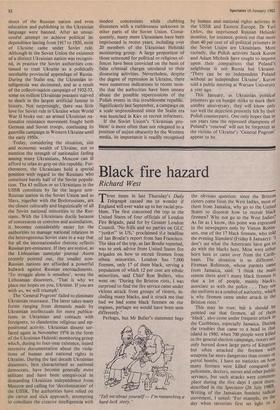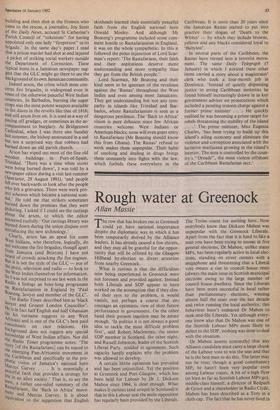Black fire hazard
Richard West Three items in last Thursday's Daily Telegraph caused me to wonder if England will ever wake up to her racial pro- blem. The first concerned the trip to the United States of four officials of London Fire Brigade, paid for by Greater London Council. `No frills and no parties on GLC "junket" in US,' proclaimed tl.e headline of Ian Brodie's report from San Francisco. The idea of the trip, as Ian Brodie reported, was to seek advice from United States fire brigades on how to recruit firemen from ethnic minorities. London has 7,000 firemen, only 17 of them black, serving a population of which 12 per cent are ethnic minorities, said Chief Ron Bullers, who went on: 'During the Brixton riots, I was surprised to find the fire service came under vicious attack from groups of rioters, in- cluding many blacks, and it struck me that had we had some black firemen on our engines, perhaps we would have been seen differently.'
Perhaps, but Mr Buller's statement begs
'Tell me about yourself — I'm researching a hard-luck story.'
the obvious question: since the Brixton rioters come from the West Indies, most of them from Jamaica, why go to the United States to discover how to recruit black firemen? Why not go to the West Indies? As far as I know, this point was expressed in the newspapers only by Vinton Robin- son, one of the 17 black firemen, who told the evening Standard (Friday 8 January): 'I don't see what the Americans have got to do with the blacks here. Most were either born here or came over from the Carib- bean. The situation is so different.' Fireman Robinson, whose parents came from Jamaica, said: 'I think the main reason there aren't many black firemen Is that a lot of people, mainly blacks, associate us with the police . . . They see the uniform as a symbol of authority, which is why firemen came under attack in the Brixton riots.'
This may be true; but it should be pointed out that firemen, all of there I 'black', also come under frequent attack n the Caribbean, especially Jamaica. During the troubles that came to a head in that island in 1980, when 700 people were killed in the general election campaign, rioters not only burned down large parts of Kingston but often attacked the firemen with weapons far more dangerous than stones or petrol bombs. I have no statistics on how many firemen were killed compared to policemen, doctors, nurses and other public servants, but such attacks were common- place during the five days I spent there, described in the Spectator (26 July 1980- Writing of the Jamaican feminist radical movement, I noted: 'For example, on the day when terrorists first set light to a building and then shot at the firemen who came to the rescue, a journalist, Joy Scott of the Daily News, accused St Catherine's Parish Council of "tokenism" for having appointed only one lady "fireperson" to its brigade.' In the same day's paper I read that a prison warder had shot at and injured a picket of striking social workers outside the Department of Correction. These typical items in a Jamaican newspaper sug- gest that the GLC might go there to see the background of its own Jamaican community. Indeed arson, the crime which most con- cerns fire brigades, is widespread even in some of the otherwise peaceful West Indian Countries. In Barbados, burning the sugar Crops was the most potent weapon available to the slaves in the revolts like that of 1816; and still arson lives on. It is used as a way of Paying off grudges, or sometimes as the ac- con1paniment to burglary. At Bridgetown Cathedral, when I was there one Sunday last summer, the bishop announced in a sad but not a surprised way that robbers had burned down an old parish church.
Arson has wiped out most of the tine old wooden buildings in Port-of-Spain, Trinidad. 'There was a time when stores Were being burned down', I was told by a newspaper editor during a visit last summer (Spectator, 29 August 1981), 'and people fell over backwards to look after the people who felt a grievance. There were work pro- ject schemes which became a national scan- dal.' He told me that strikers sometimes burned down the premises that they were Picketing. I asked if I could see the cuttings about the arson, to .which the editor answered ruefully: 'Our cuttings library was burned down during the union dispute over Introducing the new technology.' Clearly, arson has an apeal for some West Indians, who therefore, logically, do not welcome the fire brigades; though apart from Jamaica (and Brixton) I have not heard of crowds attacking the fire engines. but it is not the style of the GLC — nor of dle press, television and radio — to look to ct,he West Indies themselves for information. '30 1was not surprised to see last week in the Radio 4 listings an hour-long programme Rastafarianism in England by 'Paul uuateng, lawyer and member of the GLC'. The be Radio Times described him as 'black lawyer and Greater London Councillor'. lie is in fact half English and half Ghanaian (as his surname suggests to any West African) and is one of the GLC's best paid ,consultants on race relations. His nackground does not suggest any special ,kanwledge of West Indian affairs. Nor did the Radio Times programme notes: 'The story [of the Rastafarians] can be traced to the emerging Pan-Africanist movement in the Caribbean and specifically to the pro- phetic vision of Jamaica's national hero Marcus Garvey . . . It is essentially a
le to faith that provides a strategy for
in an alien society.' That is, to say the least, a rather one-sided summary of the Kastafarians, the 'Back to Africa' move- ntet11 and Marcus Garvey. It is about equivalent to the suggestion that English
skinheads learned their essentially peaceful faith from the English national hero Oswald Mosley. And although Mr Boateng's programme included some com- ment hostile to Rastafarianism in England, it was on the whole sympathetic. In this it followed the pious injunction of Lord Scar- man's report: 'The Rastafarians, their faith and their aspirations deserve more understanding and more sympathy than they get from the British people.'
Lord Scarman, Mr Boateng and their kind seem to be ignorant of ,the revulsion against the 'Rastas' throughout the West Indies and even among most Jamaicans. They get understanding but not any sym- pathy in islands like Trinidad and Bar- bados, where Rastafarianism is seen as a dangerous pestilence. The 'Back to Africa' vision is pure delusion since few African countries welcome West Indians or American blacks; none will even grant entry to Rastafarians (Mr Boateng should know this from Ghana). The Rastas' refusal to work makes them unpopular. Their habit of smoking and dealing in drugs brings them constantly into fights with the law, which forbids these everywhere in the
Caribbean. It is more than 20 years since the Jamaican Rastas started to put into practice their slogan of 'Death to the Whites' — by which they include browns, yellows and any blacks considered loyal to `Babylon'.
In several parts of the Caribbean, the Rastas have turned into a terrorist move- ment. The same Daily Telegraph (7 January) in which I noticed these other items carried a story about a magistrates' clerk who took a four-month job in Dominica. 'Instead of quietly dispensing justice to erring Caribbean motorists he found himself increasingly drawn in as key government adviser on prosecutions which included a pending treason charge against a former prime' minister . . . He quickly realised he was becoming a prime target for rebels threatening the stability of the island . . .' The prime minister, Miss Eugenia Charles, 'has been trying to build up this island's ailing economy and eliminate the violence and corruption associated with the lucrative marijuana growing in the island's interior. The area is controlled by the coun- try's "Dreads", the most violent offshoot of the Caribbean Rastafarian sect.'



































 Previous page
Previous page